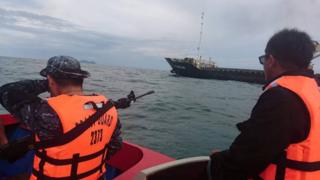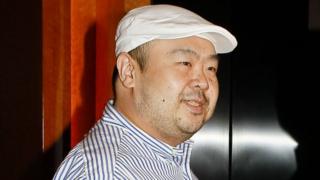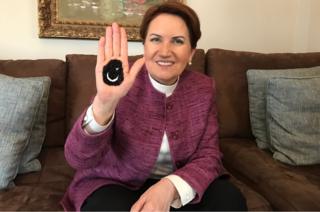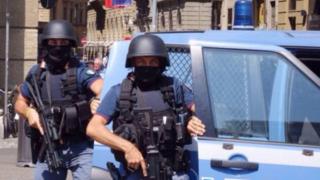Thursday, March 30, 2017
Is this the most dangerous backwater in the world?
 Image copyright Reuters
Image copyright Reuters Across the world there has been a decline in piracy and sea robbery, but one precarious expanse of ocean waters in South East Asia is bucking that trend, as maritime defence expert Swee Lean Collin Koh explains.
There was a time when __news of pirates and kidnap-for-ransom dramas in the waters off Somalia dominated global __news headlines.
In 2011, at the height of the crisis, a total of 237 incidents were reported in the area. Since then, however, piracy has decreased significantly off the Horn of Africa, despite a recent attack against a Comoros-flagged tanker and one reported incident in the third quarter of last year.
In Asia, there are reasons to be optimistic: reported piracy and sea robbery incidents, including cases of fuel-oil siphoning, have more than halved from 2015 to 2016, due to measures undertaken by both government agencies and shippers.
But there is one small stretch of ocean waters in South East Asia that could potentially be one of the riskiest regions in the maritime world.
Few people will have heard of it and it has barely hit the global headlines, compared to key waterways such as the Malacca Strait, but the Sulu-Celebes Sea, encompassing the waters around Indonesia, Malaysia's eastern Sabah state and the Philippines, has become an area of growing concern.
Since March 2016, a spate of kidnap-for-ransom incidents have been reported there and in the waters off eastern Sabah.
These attacks were attributed mainly to the Abu Sayyaf militant group operating out of the southern Philippines, although some appear to be criminal groups.
What is worrying is their evolving modus operandi. They initially targeted slow-moving, low-freeboard vessels such as tugboats (typically towing barges laden with coal bound from Indonesia to the southern Philippines) and fishing trawlers.
But they have since become more brazen, making attempts on larger ships in the area. Notably, a South Korean-flagged heavy-load carrier was attacked in southern Philippine waters in October 2016.
Indonesia, Malaysia and the Philippines have held a series of high-level meetings and issued joint statements envisaging the creation of something called a Trilateral Co-operative Arrangement (TCA).
A four-point action plan was agreed between the three countries' foreign ministers back in May 2016, but progress has not been as swift as some might have expected, even though a model exists in the form of joint co-ordinated patrols in the Malacca Strait.
Jakarta initiated this proposal and has eagerly pushed for the TCA's implementation, given that many of the kidnap-for-ransom victims are Indonesians.
But frustration within the Indonesian government at the slow progress led to it imposing a moratorium on coal shipments to the Philippines, to be extended "until there is a guarantee for security from the Philippine government".
The two countries later forged an agreement - based on a 1975 border pact - which allows Indonesian forces to conduct "hot pursuit" into Philippine territory.
Successive joint statements continued to agree to explore measures such as co-ordinated patrols and a safe vessel transit corridor through the Sulu-Celebes Sea.
The growing threat posed by the Islamic State hastened moves by the three countries including, notably, an agreement to establish command posts in Bongao in the Philippines, Tawau in Malaysia and Tarakan in Indonesia.
Stop-gap measures were put in place while the three nations worked with their domestic institutions on a deal. For example, Jakarta and Manila formalised co-ordinated patrols to take place twice a year.
Following a spate of attacks on East Malaysia-registered fishing boats crewed by Indonesians late last year, Jakarta sought assurances from the Sabah local authorities regarding the safety of roughly 6,000 Indonesian fishing crew working in Malaysian waters.
Philippine President Rodrigo Duterte also chimed in, appearing to hint at his frustration about the slow progress in the TCA when he remarked "Malaysia, Indonesia and the Philippines [must] talk about this and once for all, come up with a solution".
"There's a need for us… to talk about this seriously and to put a stop to it because it has somehow paralysed the trade and commerce in that area," he added.
International shippers have shied away from the Autonomous Region in Muslim Mindanao because of the attacks, denying the Philippine region much-needed foreign investment.
In December, Malaysian security forces clashed for the first time with Filipino gunmen in waters off Semporna, killing three of them and capturing three others. This seems to have had an effect. Late that month, Kuala Lumpur revealed that it was in final talks with Jakarta and Manila on implementing the TCA.
But a spate of new attacks this year - on a Sabah-registered fishing vessel and a Vietnamese vessel - highlighted the urgent need to go beyond mere talks.
Manila has asked both China and the United States to contribute to maritime security in international waters in the area. And in March, Indonesia, Malaysia and the Philippines finally agreed to begin patrolling the proposed transit corridor. Shippers could heave a sigh of relief, at last.
However, successfully carrying out this trilateral maritime security framework will require all three governments to sustain their commitments, including the need to put aside political concerns - such as the question of sovereignty between Kuala Lumpur and Manila over Sabah, since Mr Duterte has insisted that his administration "will stick to our claim".
If the TCA succeeds, Indonesia, Malaysia and the Philippines would not only prove to the international community that the Sulu-Celebes Sea is not a "new Somalia", but also demonstrate their ability to put aside political and diplomatic concerns to pool their efforts to deal with a common threat.
Swee Lean Collin Koh is a research fellow with the Maritime Security Programme at the Institute of Defence and Strategic Studies, part of the S Rajaratnam School of International Studies, Nanyang Technological University, based in Singapore.
Russia 'tried to hijack US election', says US senator
 Image copyright Reuters
Image copyright Reuters Russia tried to hijack the US democratic process, says a senator investigating alleged interference in the US election.
A hearing by the Senate Intelligence Committee opened on Thursday morning. Jared Kushner, President Donald Trump's son-in-law, is to appear next week.
US intelligence agencies believe Russia tried to help Mr Trump win in November by damaging Hillary Clinton.
But Russian President Vladimir Putin has flatly denied the allegations.
In the committee's opening remarks, Ranking Democrat Mark Warner said "Russia sought to hijack our democratic process" by employing a disinformation campaign on social media, which he describes as "Russian propaganda on steroids".
He said Thursday's session would examine how Russia may have used technology to spread disinformation in the US, including the possible generation of fake __news for voters in key states, such as Wisconsin, Michigan and Pennsylvania.
Embarrassing "stolen information" was released through websites such as Wikileaks, Mr Warner said, at "seemingly choreographed times that would cause maximum damage to one candidate" - Hillary Clinton.
"They did this with an unprecedented level of sophistication," he said.
Committee chairman Republican Richard Burr said "we are all targets of a sophisticated and capable adversary". He added that "if we politicise this, our efforts will likely fail".
Former National Security Agency director Keith Alexander will be one of those testifying on Thursday.
- Trump strategist 'offered to help Putin'
- Trump Russia dossier key claim 'verified'
- Russia: The scandal Trump can't shake
- Could FBI investigation ensnare Trump?
Mr Kushner, who is married to Mr Trump's daughter, Ivanka, volunteered to speak to the Senate Intelligence Committee, the White House has said, and is scheduled to appear next week.
In a joint press conference earlier this week, both Mr Burr and Mr Warner pledged not to shy away from the truth.
When asked if he had seen any links between Mr Trump and Russian interference, he said: "We know that our challenge is to answer that question for the American people.".
Mr Burr said that there had been "conversations" about interviewing Michael Flynn - who was sacked by Mr Trump as national security adviser for misleading the vice-president over his contacts with the Russian ambassador - but his appearance is not confirmed.
House bitterness
The Trump presidency has been unable to shake off allegations that members of its team colluded with Russian officials during the election campaign. The president has regularly dismissed the claims as "fake news" and Russia has also ridiculed the allegations.
President Vladimir Putin did so again on Thursday at an Arctic forum, describing them as "nonsense".
Mr Burr was a security adviser to the Trump campaign but insists he remains objective.
The House Intelligence Committee's inquiry into the matter has been beset by partisan disputes.
Ranking Democrat Adam Schiff has insisted panel chairman Devin Nunes remove himself, after accusing him of colluding with the White House.
Last week, Mr Nunes went straight to the White House after hearing allegations about surveillance of Mr Trump's team, rather than sharing them with Democrat colleagues on the panel.
He later apologised but insists he remains an objective chairman and will not step down.
As well as the two houses of Congress, the FBI is also conducting an investigation into the matter.
Kim Jong-nam's body to be released to North Korea
 Image copyright AFP
Image copyright AFP Malaysia has said it will release the body of the assassinated half-brother of North Korea's leader following negotiations with Pyongyang.
Prime Minister Najib Razak said a coroner had approved the release of Kim Jong-nam's body.
Mr Kim was murdered at Kuala Lumpur airport with a lethal nerve agent last month.
The assassination led to a major diplomatic dispute between Malaysia and North Korea.
Malaysia has not directly blamed North Korea for the killing, but there is widespread suspicion that Pyongyang was responsible.
- Malaysia and North Korea - a friendship on ice
- Kim Jong-nam: Main players in mysterious killing
- Who could organise a VX murder?
Prime Minister Najib said nine Malaysians who had been barred from leaving North Korea had now been given permission to return to Malaysia.
He also said that all North Koreans would be allowed to leave Malaysia.
BBC South-East Asia correspondent Jonathan Head says that probably includes three North Koreans who are wanted by Malaysian police in connection with the killing.
Malaysia expressed outrage earlier this month over what it described as North Korea holding its citizens hostage. But now it appears to have acceded to North Korea's wishes to get those Malaysians released, our correspondent adds
Mr Najib said: "I had a deep personal concern about this matter, and we worked intensively behind the scenes to achieve this successful outcome.
"Many challenges were overcome to ensure the return of our fellow Malaysians."
He added: "The government believes strongly in the principles of justice and sovereignty. Our police investigation into this serious crime on Malaysian soil will continue.
"I have instructed for all possible measures to be taken to bring those responsible for this murder to justice."
Interpol alert
Two women - one Vietnamese woman and one Indonesian - have been charged with killing Mr Kim. Both reportedly believed they were participating in a television prank.
CCTV footage shows the two approach Mr Kim as he waited for a flight and smear VX nerve agent on his face. He died within 20 minutes.

Interpol has issued a "red notice" for four North Koreans wanted in connection with the assassination.
Malaysia said the four men were at the airport on the day Mr Kim was killed and had since left the country. They are thought to be in North Korea.
A red notice is the nearest equivalent to an international arrest warrant. The move is unlikely to result in arrests as North Korea is not a member of Interpol.
The four named in the Interpol red notice are Ri Ji Hyon, 33, Hong Song Hac, 34, O Jong Gil, 55, and Ri Jae Nam, 57.
Kim Jong-nam, who was the estranged, elder half-brother of Kim Jong-un, had been passed over for the North Korean succession and was living in the Chinese territory of Macau at the time of his death.
It is not clear where Mr Kim's wife and children are, although his son appeared in a video earlier in March and said the family were together.
North Carolina 'bathroom' law: Deal reached on repeal
 Image copyright Reuters
Image copyright Reuters A late-night deal has been reached in North Carolina to repeal a controversial law that limits protections for lesbian, gay, bisexual and transgender (LGBT) people.
A key element banned transgender people from using toilets in accordance with their chosen gender, earning the measure the "bathroom law" tag.
The deal came hours before the state was to lose key basketball fixtures.
However, the terms of the deal have angered LGBT activists.
It must also still pass both the state House and Senate in votes on Thursday morning and it remains unclear whether it has enough support.
The deal was announced late on Wednesday by Democratic Governor Roy Cooper and Republican state lawmakers.
Mr Cooper, who ran for office on a platform of repealing the measure, known as House Bill 2, said: "It's not a perfect deal, but it repeals HB2 and begins to repair our reputation."
Majority Republican leaders Tim Moore and Phil Berger said in a joint statement: "Compromise requires give and take from all sides, and we are pleased this proposal fully protects bathroom safety and privacy."
'Train wreck'
The law had required transgender people to use toilets in schools and government buildings that correspond to the sex listed on their birth certificates.
Although the deal repeals the law, state legislators will remain in charge of policy on multi-occupancy restrooms.
It creates a moratorium so that local government, state colleges and universities cannot pass measures extending non-discrimination on sexual orientation and gender identity until December 2020.
The compromise angered LGBT activists.
Equality NC executive director Chris Sgro said before the proposal was agreed that it was "a train wreck that would double down on anti-LGBTQ discrimination. North Carolinians want a clean repeal of HB2, and we urge our allies not to sell us out".
Human Rights Campaign president Chad Griffin said: "At its core, it's a state-wide prohibition on equality."
Businesses, entertainers and sports teams had boycotted North Carolina in the wake of the law's passage last year.
Its largest city, Charlotte, lost the National Basketball Association (NBA) All-Star game, which was moved to another state.
Who and what have boycotted North Carolina?
- Paypal
- Deutsche Bank
- Bruce Springsteen
- Pearl Jam
- The band Boston
- Demi Lovato
- Nick Jonas
- Cirque de Soleil
- National Collegiate Athletic Association (NCAA) basketball, golf and swimming
- ACC Swimming and Diving Championships
North Carolina was on Thursday set to lose its ability to host any college (NCAA) basketball championships from 2018 to 2022 "absent any change" in the House Bill 2.
The controversial bill will cost the state more than $3.67bn in lost business over 12 years, according to a recent Associated Press analysis.
Mr Cooper beat Republican Pat McCrory, who had signed the law, in an election in December.
The then-governor-elect attempted to reach a compromise over the law during a special session in December, but failed.
Critics of the bill say it has encouraged lawmakers in other states to put forward their own version of House Bill 2.
As of March, 16 states were considering bathroom bills, according to the National Conference of State Legislatures.
Among those states are Texas, Tennessee, Arkansas, Illinois and Minnesota.
Ronaldo statue: Sculptor Emanuel Santos defends his bizarre work
 Image copyright AFP
Image copyright AFP The sculptor behind a statue of Cristiano Ronaldo that left football fans scratching their heads has said his work is just "a matter of taste".
Emanuel Santos said the bust, unveiled on the Portuguese island of Madeira, was "not as simple as it seems" to create.
The unveiling of the Ronaldo statue led many on social media to question the work's resemblance to the player.
It was revealed at a ceremony to name the island's airport after him.
"It is impossible to please the Greeks and Trojans. Neither did Jesus please everyone," Mr Santos said.
He said that his creation was "not as simple as it seems" to produce, adding that it took him 15 days to complete and that the finished item "was a matter of taste", the Guardian newspaper reports.
"Cristiano saw the photos that his brother sent him," Mr Santos told broadcaster Globo.
"I was with his brother at Cristiano's museum in Madeira and from the messages he sent, I could tell that he liked what he saw," he said.
Mr Santos said that Ronaldo had asked him to make minor changes in order to make the player look younger.
"He only asked for some wrinkles that gave him a certain expression in his face when he's about to laugh to be changed," he said.
- Take a look around Ronaldo's house
On Wednesday, Mr Santos told Portuguese TV channel RTP that he had not yet had the opportunity to talk to Ronaldo personally since the unveiling, but said that he would "reach out to him to know his feedback".
"It's always a great honour to work on project like that," he said.
However, shortly after the sculpture was revealed on Wednesday, it was mocked on the social media site Twitter.
"They got the Adams Apple [sic] and the hair right. That's something," wrote Ryan Post. "Creepy!" added Mel Bishop.
Some even suggested that the sculpture looks more like the former Republic of Ireland captain Niall Quinn.
Portuguese President Rebelo de Sousa said Ronaldo "projects Madeira and Portugal across the world far more than anybody else".
The 32-year-old forward is a local hero in Madeira, where he is seen as a rags-to-riches success. He already has a museum about him in his hometown of Funchal.
The player later said on Twitter: "Happy and honoured to have my name given to the Madeira airport!"
Ronaldo is not the first footballer to have an airport named after him. Belfast airport was named after former Manchester United player George Best in 2006, a year after he died.
Portugal's president and the prime minister flew to Madeira to unveil the tribute.
The sculpture will remain on permanent display outside the terminal entrance.
Turkey referendum: The ultranationalists who could sway Erdogan vote

"They all talk about Mr Erdogan. What if I am the country's next president?" Meral Aksener asks.
A former interior minister and a high-profile name in Turkish politics for over two decades, 60-year-old Ms Aksener has now emerged as one of the leading figures of the No campaign in Turkey's upcoming referendum and a possible challenger to President Recep Tayyip Erdogan.
In Turkey's closely-contested 16 April referendum, voters will decide whether to change the constitution to establish a presidential system and grant the president further executive powers.
Meral Aksener's far-right Nationalist Movement Party (MHP) may be the smallest party in parliament but it may also hold the key to the president's ambitions.
"In the parliamentary system you have checks and balances. Here you have no such thing," says Ms Aksener of the proposed changes.
"This is out-dated. This is a monstrosity. Anyone who has such powers would go crazy. I definitely would if it was me."
What will a Yes-vote mean?
- Role of prime minister would be scrapped and president made head of Turkey's executive as well as head of state
- President would be allowed to retain ties to a political party - not currently the case
- President would have new powers to appoint ministers, prepare budget and enact certain laws by decree
- President alone would have power to dismiss parliament and to announce state of emergency
- New post of vice president would be created
Why is Turkey holding a vote?
Voting starts for Turks abroad
Turkey says 'No' to saying 'No', ahead of its referendum
The ultranationalists may have received only 12% of the vote at the last general election, but it was their unexpected support for Mr Erdogan and his ruling AK party that paved the way for the referendum.
The MHP has since split. While the leadership campaigns for a Yes vote, others in the MHP back the No campaign, and many of their voters are undecided.
Tensions have spilled over in party ranks and Meral Aksener herself has been ejected from the MHP for challenging the leadership but still has grassroots support.
Several of her rallies have been banned or cancelled and another leading opposition figure, Sinan Ogan, came under attack when a man knocked down the lectern from which he was giving a speech.
It was Mr Ogan, not the attacker, who was thrown out of the party.
"No matter what the leadership wants, if the MHP party base says yes, the referendum result will be a yes. If the party base says no, then the result will be a no. Simple as that"
Both he and Ms Aksener are adamant that they could sway around 80% of nationalist voters towards a No vote.
But MHP deputy chairman Erkan Akcay disagrees. "Within 10-15 years the whole of Europe will see how successful this presidential model is and will try to adapt accordingly," he argues.
Recent polls suggest the race could be very tight.
That, according to Meral Aksener, is why a row blew up between Turkey and several European countries.
First President Erdogan accused the German government of "reverting to Nazi practices" when Turkish ministers were prevented from addressing campaign rallies.
Then Dutch riot police clashed with Turkish protesters in Rotterdam, as police escorted a Turkish minister out of the country.
- Erdogan's Nazi jibe over German rally ban
- Dutch ambassador barred in Turkey row
Ms Aksener argues that the government provoked tensions abroad because attempts to antagonise the secular opposition in Turkey had failed.
"The government decided to build a mosque in Taksim Square (in central Istanbul). They expected a riot. Nothing happened. The headscarf ban in the army was lifted. Nothing happened. So they escalated a tension with first Germany, and then the Netherlands."
"In foreign policy, you should think before you speak. If you make foreign politics a tool for domestic politics, our country loses in the end. The nation has seen through this. I do not think the latest crisis will drive a Yes vote."
As the date of the referendum approaches, Turks are holding their breath. Few votes in Turkey have been quite so unpredictable in recent years.
The government-led Yes campaign is trying to win over undecided voters with big advertising drive billboards and national media.
President Erdogan appears on TV every day, drumming up support for a constitutional change that he says is necessary for the country's stability.
The No campaign, meanwhile, is struggling to get its message across, complaining of an unbalanced media and of rallies being banned by local authorities. Nearly a dozen pro-Kurdish opposition MPs have been jailed.
Meral Aksener does not even want to consider defeat. "No matter what it costs me, I will be working towards a No."
'Exploding' soup dumpling video angers Asian foodies
 Image copyright TimeOut London
Image copyright TimeOut London Asian food lovers are fuming over a video they say "manhandles" traditional soup dumplings.
The video published by Time Out London on Facebook shows diners attempting to burst their Xiao Long Bao (little basket buns), and throw out the soup.
Originating in China, Xiao Long Bao have a passionate foodie fan following.
Many point out the traditional way is to suck out the soup and eat the dumplings. Time Out said it burst them in order to show the soup inside.
The steaming hot broth is, for many, the most prized part of each Xiao Long Bao.
"Love popping spots and eating dumplings? Combine the two with exploding soup dumplings," Time Out London says in a post on how to eat dumplings served at a restaurant in London.
"They're super dribbly and also very satisfying to watch," the video adds, showing several dumplings being broken with chopsticks.
Characterised by its translucent skin, each dumpling is filled with juicy minced pork and broth and eaten with ginger strips and vinegar.
Popular in many Asian countries, its Taiwanese version has earned a Michelin star.
The video has been widely panned by food lovers on Facebook, many of whom criticised the "lack of education" that went into filming.
"The entire video was one big blasphemy. I'm screaming internally and not in an excited way," said Kenneth Ting. "That is not how you eat Xiao Long Bao. It's a complete waste of something so good."
"This video is giving me anxiety because you are definitely not supposed to squeeze the soup out of them or 'explode' them as you crudely put it," said Christina Chan in a Facebook comment that drew more than 1,000 likes.
"My traditional food is not here just for your next cool trend."
You might also be interested in:
Cyclone Debbie: Saturated cockatoo in photo dies
The 'most normal town in England'
French artist turns into a chicken
Similar anger was expressed by other users who watched the video, like Singaporean Jasmine Tan. She wrote: "Watching you waste all that soup is akin to someone getting fish and chips and peeling the batter off."
"This is not 'hip' or cool. Just eat it right and stop wasting the best part: [the soup]," said Casey Pardue.
Contacted by BBC News, Time Out London said: "We love nothing more than discovering and celebrating incredible food from around the world.
"We burst soup dumplings to show people in our video the delicious soup that was inside them, so they could enjoy the visual treat of the broth that is tasted but not seen.
"Later on, you see the journalist biting into the unburst dumpling and enjoying the 'explosion' on her taste buds."
Brian Chow commenting on the Facebook page offered proper instructions on how to eat Xiao Long Bao.
"The soup inside is not supposed to 'explode' in your bowl but in your mouth," he explained, noting that these special dumplings were "usually more expensive than normal dumplings" because of the extra effort it takes to put the soup inside.
Singaporean food blogger Leslie Tay agrees the video just didn't strike the right tone.
"Soup is the key component of this dumpling," he told BBC News.
"There are many ways of eating Xiao Long Bao, so there is really no fixed way to enjoy it. But you shouldn't play with it like that. It is simply not showing respect to the expertise of the chefs who created it."
"Just like Japanese sushi chefs, it takes a lot of skill to create Xiao Long Bao," he said.
Dr Tay also said that it was probably "just a way of trying to grab attention".
Reporting by the BBC's Heather Chen.
Italian police in Venice arrest three Jihadists
 Image copyright Polizia di Stato
Image copyright Polizia di Stato Three adults and a girl have been detained in the centre of Venice as suspects in an alleged jihadist cell.
Police had been monitoring the group from Kosovo for months amid concerns they were planning to join Islamist militants in Syria, reports said.
But police moved in at dawn on Thursday amid fears of a potential attack in the wake of the last week's murder of four people in London, reports said.
Twelve addresses were raided including 10 in the city's historic centre.
One of the raids took place close to the famed La Fenice opera house at around 04:00 (02:00 GMT), Italian media said.
Police said all four of those held had Italian residence permits. They said Italy's specialist Digos crime squad had been investigating the three adults on suspicion of radicalisation.
Two of the three had been working as waiters, one report said.
Italian police apparently tapped communications referring to the 22 March attack at Westminster, when Khalid Masood drove a car into pedestrians and stabbed a police officer outside parliament.
Who was Khalid Masood?
'No evidence' Masood linked to IS
Police decided to move in amid concerns that the alleged cell was planning a similar attack in Venice, possibly targeting a high profile tourist site such as the Rialto bridge over the city's Grand Canal, Italian media reported.
Defence Minister Roberta Pinotti praised the authorities' handling of the operation and said it showed their commitment in the fight against terrorism.
American Airlines pilot dies on Dallas-Albuquerque flight
 Image copyright Reuters
Image copyright Reuters A pilot died on Wednesday during a flight from Dallas to Albuquerque, New Mexico, American Airlines have confirmed.
The Boeing 737-800 was two miles from landing when the captain declared a medical emergency, an Albuquerque airport spokesman confirmed.
"They landed without incident, taxied to the gate and were met by medical personnel," he told the Albuquerque Journal.
None of the passengers was injured.
American Airlines confirmed the pilot's identity as first officer William "Mike" Grubbs.
US media quoted airline spokeswoman Polly Tracey as saying: "We're taking care of first officer Grubbs' family and colleagues and our thoughts and prayers are with them during this time."
In 2015, an American Airlines pilot died in a medical emergency on an overnight flight from Phoenix to Boston.
The flight was safely diverted by the co-pilot to Syracuse, New York.
Campaigners seek 'to sell US politicians' browsing data'
 Image copyright Getty Images
Image copyright Getty Images The organisers of two privacy campaigns say they plan to buy, then sell, the internet browsing histories of some of America's best-known politicians.
But experts said the schemes were doomed to fail.
The campaigners are protesting against a congress vote to repeal a key internet privacy law earlier this week.
They said the SJR34 resolution, which would let companies continue to sell user data without their consent, would infringe people's privacy.
President Donald Trump is expected to sign the order soon.
One campaign, run by Adam McElhaney, has raised $146,732 (£117,698) in four days on the crowd-funding platform GoFundMe - 9,648 people have made donations.
Mr McElhaney said he planned to "turn the tables" on all of those who had voted to ditch the law.
'Available for everyone'
"I plan on purchasing the internet histories of all legislators, congressmen, executives, and their families and making them easily searchable at [my website] searchinternethistory.com," he said
"Anything they have looked at, searched for, or visited on the internet will now be available for everyone to comb through," he added.
Mr McElhaney's site is also inviting votes on which politician's data should be purchased first, with Speaker of the House and Republican Paul Ryan topping the list.
Another campaign, run by actor Misha Collins, has raised $62,000 towards a $500m target.
He said: "Since congress has made our privacy a commodity, let's band together to buy their privacy,"
"This GoFundMe [campaign] will pay to purchase the data of Donald Trump and every congressperson who voted for SJR34, and to make it publicly available."
'Individually identifiable'
But several reports suggested the plans were technically illegal.
The US Telecommunications Act prohibits the sharing of "individually identifiable" customer information except under specific circumstances.
Marketers may access user browsing data, but only in aggregate, for the purposes of targeted advertising.
And internet service providers (ISPs) would suffer huge brand damage if they sold off identifiable personal data.
Mike Masnick, founder of the Techdirt blog, said: "Here's the real problem: you can't buy congress's internet data.
"You can't buy my internet data. You can't buy your internet data. That's not how this works."
On Tuesday, the House of Representatives voted to repeal the Obama-era law, which required ISPs to obtain permission before sharing personal information - including location data.
The law was set to take effect at the end of this year.
Supporters of the move to repeal the law said it would increase competition, but critics said it would have a "chilling effect" on online privacy.
Brexit: No talks with the UK before clear withdrawal terms, says France

France has insisted that the UK must first sort out the terms of its exit from the European Union before talks can move on to future relationships.
President Francois Hollande told British Prime Minister Theresa May that talks must settle the UK's financial bills and the rights of citizens.
Other pro-EU politicians meeting in Malta expressed a similar view, saying they would not allow "cherry-picking".
Mrs May called for simultaneous talks during exit negotiations.
But in a phone call, Mr Hollande warned her that the withdrawal agreement should come first, a common line among European leaders.
"First we must begin discussions on the modalities of the withdrawal, especially on the rights of citizens and the obligations arising from the commitments that the United Kingdom has made," he said.
Read more on this story:
- Brexit: What happens now?
- The key issues
- Kuenssberg: Reading between the lines
Meeting in Malta, members of the centre-right European People's Party (EPP), the largest group in the European parliament, said they would focus on:
- Ensuring that the rights of EU citizens in the UK continue
- Avoiding a hard border between Northern Ireland and the Republic of Ireland
- Settling the UK financial bills with the bloc, estimated to be as much as 60bn euros ($64bn; £51bn)
The party chairman Manfred Weber said they would "not allow the cherry-picking we saw over the past few decades", and that the UK could not shape the future relationship with the bloc in the way it had done as a member of the EU.
Speaking at the meeting, German Chancellor Angela Merkel did not mention Brexit directly, but said the EU must guarantee the prosperity and security of its citizens or risk them turning away.
She had already said that Britain's commitments to the EU had to be dismantled before talks could move on.
Mrs Merkel ended her speech with a quote from the philosopher Erich Fromm: "He said one loves what one makes a lot of effort for and what one makes a lot of effort for one loves.
"And it's important we must make an effort for this Europe because we love it and we want to leave it behind in a good position for future generations."
- More European reaction
The European Council President, Donald Tusk, is expected to set on Friday draft guidelines that will form the basis for EU negotiations with the UK.
They will be amended and then approved by the remaining 27 EU leaders in a month's time, and they are likely to set out a clear negotiation schedule, the BBC's Chris Morris in Malta says.
Kuki Gallmann's Kenya safari lodge burned down
 Image copyright Mukutan Retreat
Image copyright Mukutan Retreat A luxury safari lodge in Kenya owned by Italian-born conservationist and author Kuki Gallmann has been burned down by suspected cattle herders.
It is the latest attack in the drought-stricken Laikipia region by suspected herders, who have been invading private property in search of fresh grazing.
There were no visitors staying at the Mukutan Retreat at the time of the attack, according to local reports.
The attack may have been retaliation for a police operation, reports said.
Earlier this week, police reportedly shot dead about 100 cattle in the surrounding Laikipia Nature Conservancy, which is owned by Ms Gallmann.
- Africa Live: Updates on this and other stories
- Are Kenya ranch invasions driven by drought or politics?
Ms Gallmann, who is best known internationally for her memoir I Dreamed of Africa, has not commented.
However, her Facebook page was updated on Thursday with a link to an article in which landowners denied having any role in the police operations or encouraging them to shoot herders' livestock.
"Our association and its members has absolutely no influence or voice in the operation and anyone suggesting differently is spreading falsehoods," the Daily Nation quoted Martin Evans, chairman of the Laikipia Farmers' Association, as saying.
"Along with area resident pastoralists, its smallholder farmers, wildlife, and business community, our members are the victims of this crisis, not its instigators," he said.
Laikipia, which covers about 10,000 sq km in Kenya's central highlands, is where some of the country's largest white landowners are based.
Insecurity has risen sharply in recent months as a drought has led armed herders to seek out new pasture, pitting them against big landowners and smallholders.
Tens of thousands of cattle are thought to have been driven onto private land and at least a dozen people have been killed.
British rancher Tristan Voorspuy, who also ran a safari company, was shot dead in early March while inspecting his lodges in Laikipia.
Hundreds of herders have been detained as part of police operations, and the authorities have accused some local politicians of using racially charged language and inciting locals to occupy private property illegally, ahead of general elections due in August.
The MP for Laikipia North, Matthew Lempurkel, was charged with incitement earlier this month.
An additional factor, some of the landowners say, is that there is now just too much livestock in the region, causing overgrazing and destruction of previously fertile land.
The BBC's Ferdinand Omondi in Nairobi says the pastoralists appear now to have resorted to a scorched earth policy in their battle for grazing.
As well as the attack on Ms Gallmann's lodge, they set about 4 sq km of the Laikipia Nature Conservancy on fire.
The herders accused police of trying to force them off the land by shooting their livestock. Police say the livestock were killed in crossfire with the herders, who were using the animals as shields.
The BBC's Alastair Leithead tried to approach herders last month to ask about their grievances, but was forced to retreat when they shot at him.
Ms Gallmann owns about 360 sq km in Laikipia, which is home to rare wildlife, birds and trees. Her organisation also runs community, education, arts and sports projects.
The Mukutan Retreat lodge is made up of four stone and wood cottages, perched on the edge of the Mukutan Gorge.
Visitors can pay more than $650 (£525) a night to stay there, according to travel websites.
Saturday, March 18, 2017
Whatever we feel about Trump, his Irish visit is a necessary evil in the world of realpolitik
It's tempting to speculate that US President Donald Trump has promised to make space in his schedule for a trip to Ireland in the same spirit that he said he'd build a wall between the US and Mexico, forcing the Mexicans to pay for it.
In other words, no need to worry about shampooing the red carpet and ordering bulk supplies of stars and stripes bunting just yet.
But if he lasts a four-year term, we can be sure he'll call in the Taoiseach's invitation. Not because he's taking an interest in his "new friend" Enda's little country. Not because he wants to inspect his Doonbeg golf resort investment. But because a state visit will help to secure the Irish-American vote.
Please sign in or register with Independent.ie for free access to Opinions.
Sign In
New to Independent.ie? Sign up
How abortion lie after one-night stand led to a fatal confrontation work van
Dressed in a blue anorak, and with arms folded, murder suspect Roy Webster sat at a square table in an interview room at Wicklow garda station, facing two officers.
Detective Sergeant Fergus O'Brien was asking the questions.
"I swung open the side door of the van, and I grabbed the first thing I could, it was a hammer.
"I hit her on the head with it," Mr Webster told him.
He immediately covered his mouth with his hand and leaned forward as he said it. After a pause, he continued to speak.
Detective Garda Owen Martin and solicitor Dermot Hickey were both taking notes.
The scene was displayed on screens across the courtroom as the DVD was played back and the jury heard Mr Webster's chilling account of how he fatally beat mother-of-three Anne Shortall.
The interview was one of two he gave gardaí on April 7 and 8, 2015. Only a few hours earlier, while still only helping them with their enquiries about her disappearance, he had broken down at his own kitchen table and led them to her body, hidden in his workshop.
But this was no murder confession - Mr Webster went on over the course of those two interviews to assert that he had no intention of killing Ms Shortall when he assaulted her with a hammer in a moment of "fear and panic" on April 3, 2015.
Mr Webster (40), a married father-of-two of Ashbree, Ashford, Co Wicklow, denies murdering Ms Shortall (47) on April 3, 2015, at The Murrough, also in Wicklow.
He has pleaded guilty to manslaughter but the prosecution did not accept that plea.
Confrontation

As the trial continued this week, the jury heard Mr Webster told gardaí how his "one-night stand" with Ms Shortall had eventually led to their confrontation in his van.
They had got talking on December 20, 2014, at the Forge pub before going back to her apartment where they had sex, he recalled. By April, he told detectives, she had claimed she was pregnant by him and was demanding £6,500 (€7,488) for an abortion.
On April 3, he said, they arranged by text to meet and he drove her to The Murrough, where they argued. They got out of the van and she started to threaten "she was going to blow the lid if I didn't get her money".
He said he pleaded with her that he had a wife, a child and a newborn baby at home and she replied: "I don't give a s**t."
He described his head as spinning and said he could "just see my whole world crashing down - this one had my back to the wall".
He told gardaí after the first hammer blow to the forehead, she fell back into the van and said "you f***ing pr**k, I'll ruin you", and he hit her again - three to four times in all.
"It was like I was looking down at myself…it was like I was looking down at someone else doing it, but I could see it was me doing it. It was like watching a horror movie," he said.
Mr Webster told gardaí he closed the van door and drove on. He said he stopped and taped Ms Shortall's head first, as there was blood coming out of it and he "thought the tape might stop the blood".
"I also put tape on her hands to stop her flailing around," he said. "I suppose subconsciously I didn't know whether she was dead or alive…it was like I was out of my mind."
He said it was not his intention to kill her, saying when he hit her, "I suppose it was a panic reaction...a mixture of fear and panic".
Once he got home, it was "as if everything was back to normal, I was back to myself, it was like a switch turned off".
He fell asleep watching TV on the couch, waking when Ms Shortall's daughter Emma called after finding his number on her mother's phone. He told her he didn't know what she was talking about.
The next day, the family went shopping in the family car and when he returned, he said, he moved the body from the van into the workshop.
Sunday was a "pyjama day" watching movies with his children.
Det Sgt O'Brien asked him if he had thought Ms Shortall might have been alive in the back of the van.
"Possibly, yes," he replied. "That is why I put the tape on her hands."
He was then told that results from the post-mortem examination showed Ms Shortall had not been pregnant.
"I f**king knew it," was Mr Webster's response.
Later, Dr Geraldine O'Kelly told the jury Ms Shortall, her patient, had known she was not pregnant in January - three weeks after her Christmas encounter with Mr Webster.
Read More: Webster 'acted completely normal' after hammer attack
State Pathologist Professor Marie Cassidy said in evidence she established Ms Shortall had sustained nine blows to the head with a moderately heavy object with a small striking surface.
This resulted in lacerations to the scalp and face, including injuries to her left ear, which was split. Injuries to the hands may have been "defensive type" wounds, Prof Cassidy observed. The skull was not fractured and the brain had sustained only slight swelling, she said.
"The multiplicity of forceful blows to the head could have caused rapid concussion or unconsciousness," Prof Cassidy told the jury.
She said this could cause death but was also "compatible with continued life".
"It can't be excluded that death was due to the head injuries alone," Prof Cassidy said.
However, she continued: "If (the duct tape bindings to the head) was applied while she was still alive this would have excluded all possibility of surviving the head injury."
"The cause of death was blunt force trauma to the head and obstruction of the airways," Prof Cassidy concluded.
In a statement read out to the court by Paul Greene SC, for the prosecution, Carmel Phibbs said she was friends with Mr Webster's wife Sinéad.
On April 3, she was at the house when Roy Webster arrived home between 4.30pm and 5pm wearing dusty workclothes.
"He was acting completely normal," she said in her statement.
Evidence for the prosecution is expected to conclude on Monday.
Irish Independent
The skies are desolately quiet without the crew of Rescue 116
For the third day since the tragic loss of Rescue 116, white waves thrashed on the Atlantic off the coast of the Mullet peninsula, making diving impossible.
At the best of times, conditions are treacherous at remote Black Rock, a rocky mound rising 80m above the sea, on which a lighthouse was perched in the 1860s.
There could scarcely be a worse location in terms of mobilising a search-and-recovery operation.
But a critical three-hour window between low tides on Monday could prove to be the break that the search teams have been waiting for amid mounting anguish for the devastated families of the three missing crew members of Rescue 116.
The search has now been narrowed to a small section of the ocean, some 100m by 80m at the rocky base, where the signal from the black box was detected.
The shores of Blacksod Bay are being combed by a volunteer crew of around 250 people who have come to do what they can. In the meantime, all the suffering families can do is wait.
For Rescue 116, Monday night's mission had been a fairly standard operation - almost identical to one carried out days beforehand.
On March 8, the helicopter provided top cover to R118, in a medical evacuation of a Russian fishing vessel, after a crew member suffered a sudden illness.
In that mission, both helicopters refuelled at Blacksod prior to transiting to the scene amid early-morning conditions described as "challenging".
On Monday night, it was again a fisherman working on board an international blue whiting fleet, some 250km off the Mayo coast but who, this time, had been injured, which saw R116 again called to provide top cover duty. The weather was, again, poor, with fog and driving rain.

Vincent Sweeney, the principal keeper at Blacksod lighthouse, was expecting the same two helicopters to refuel. As was usual, his son Simon and nephew, Fergus, helped him to lay out the cable for a swift operation expected to take 15 minutes.
Vincent told Simon and Fergus to head home, as it would be 11pm at least before he was expecting them.
But at around 1.20am, Simon roused Fergus with an urgent message: R116 had gone down.
An ambulance already stood station at Blacksod lighthouse, along with Irish Coast Guard volunteers.
R118, which landed the injured fisherman to safety, had spotted wreckage floating out at sea. There had been no mayday signal.
Malin Head Coast Guard tasked the Shannon helicopter, along with an Air Corps fisheries protection aircraft, RNLI lifeboats from Ballyglass and Achill, and several local fishing vessels, to mount a search operation.
A casualty, later confirmed as Captain Dara Fitzpatrick, was spotted in the water. Her condition was critical, and she was confirmed dead at Mayo University hospital in Castlebar.
Still missing are the remainder of her crew - chief pilot Mark Duffy and winchmen Paul Ormsby and Ciarán Smith.
Capt Fitzpatrick (45) was dubbed the poster girl for the Irish Coast Guard service because of her TV appearances on an RTÉ series on the rescue services.
Courageous, vivacious and beautiful, she was a hero for trainee pilots at Waterford where she was based.
"She signified what was possible for women in aviation. I just thought she was fantastic," surgeon Geraldine Cunniffe-Conlon, who learned to fly at Waterford, said.
A week-and-a-half before the tragic accident at Black Rock that claimed her life, she took part in the most gruelling training exercise dubbed 'the dunk' - helicopter underwater egress training, or HUET, involves being put upside-down underwater in a helicopter simulator, pitch-black with churning waves and rain.
The goal is to find your orientation before pushing on the window to escape.
"They get them to jump off a high board and they're terrified. It goes against every human reaction," Capt Fitzpatrick's sister, Niamh Fitzpatrick, said. "But they knew they need every ounce of training, so they did it.
"Dara had been dreading it and she was so happy that she wouldn't have to do it for another three years. And then a week-and-a-half later, the helicopter goes down," she said.
Niamh believes that the family had in some way felt a lessening worry for Capt Fitzpatrick as the years had gone on.
"In the early days we would have been very worried when she was going out, especially in stormy weather, you'd have a band of fear going around your middle," she said. "I think we did feel that worry diminish, because when we got that call on Tuesday night we got a shock - it was like being hit by a truck."
Capt Fitzpatrick began her extensive career as a helicopter pilot in Shannon in the 1990s and was "probably the most experienced pilot in CHC", the company which provides helicopter search-and-rescue services for the State.
Winchman Ciarán Smith (38), a father-of-three, was a keen cyclist and former Air Corps member who completed the 2,200-kilometre ultra-cycling event, Race Around Ireland, in 129 hours and 43 minutes to raise €10,000 for children's cancer organisation, Aoibheann's Pink Tie.
Pilot Mark Duffy (51), a father of two, lived in Blackrock, Co Louth, and joined the Coast Guard having trained in the US, where he worked with the Californian Coast Guard for seven years.
His wife Hermione Duffy posted an emotional message on Facebook to thank people for their "love and compassion", describing him as her hero and her soulmate.
Several hundred people attended a candle-lit vigil in his home village last night.
"There is so much emotion in the village and everybody wants to reach out and give their support to the family," Fr Brian White said.
Paul Ormsby (50) was born in Oranmore road in Ballyfermot, Dublin, and lived there all his life.
He was a devoted carer to his mother Kitty until her death some years ago. He, too, was a former member of the Air Corps and saved countless lives in a career spanning almost 30 years.
As a team aboard R116, they were the protective red dragon of the Dublin coast, providing a beacon of hope and care.
The skies are desolately silent without them.
Irish Independent
'There won't be an ISEQ share index checked in Dalkey tonight' - Twitter reacts as Cuala make hurling history
Blackrock fell short in the rugby but Cuala produced a masterclass to ensure the All Ireland senior club hurling title is on its way to South Dublin.
The Dalkey men saw off the challenge of Clare's Ballyea - 2-19 to 1-10 - as they became the first Dublin team to ever lift the trophy.
Dalkey is not exactly a hurling hotspot and with the county team in transition at the moment, it makes their victory all the more incredible.
We are still waiting for their most famous fan - Dancing Dessie Cahill - to have his say, but in the meantime, here is some of the best Twitter reaction.
There won't be a cow milked in Dalkey tonight ! Congrats @CualaCLG !#CualaAbu #Cuala #dancingdessie @RTERadio1 #GAABEO @RTEsport https://t.co/PvoR3sGzQO
— john creedon (@johncreedon) March 17, 2017
"And Cuala win the All Ireland. There won't be a yummy mummy manicured in Dalkey for a fortnight" #TheToughest
— Oliver Callan (@olivercallan) March 17, 2017
There won't be an ISEQ share index checked in the parish of Dalkey tonight #Cuala
— david henderson (@dvehendo) March 17, 2017
That win by Cuala is the biggest win for any club the borough has ever seen. #Cuala #TheToughest
— Brian Murphy (@brumurphy) March 17, 2017
@CualaCLG @clubifyapp Delighted for Cuala. Amazing, Historic, Game Changer in hurling no doubt.
— Chris Curran (@ChrisCurran_IRE) March 17, 2017
'This team had this dream for a long time' - Oisin Gough reflects on Cuala's day of glory #RTEgaa pic.twitter.com/G0lPHsN5ur
— RTÉ Sport (@RTEsport) March 17, 2017
Dublin celebrated historic Cuala victory painting its famous landmarks #backingcuala pic.twitter.com/FexcvZ7s2O
— Andrew browne (@Andrewbrowne12) March 17, 2017
There won't be Goldfish Fed around Cuala tonight.... https://t.co/ao2ctfydQl
— Tommycn19 (@tommycn19) March 17, 2017
ALL-IRELAND CHAMPIONS!!!!!!!
— Cuala Ultras (@cuala_ultras) March 17, 2017
Online Editors
Ireland 'won't be following UK in quitting the European Union'
Taoiseach Enda Kenny has staunchly defended Ireland's membership of the European Union as he described Brexit as a solely "British policy".
Speaking to Bloomberg in New York, Mr Kenny rejected any suggestion that Ireland could follow in the UK's footsteps and quit the EU.
"Brexit is a British policy and was certainly not what we wished for in Ireland," Mr Kenny said.
"It is not a trigger for Ireland to follow suit. Nor is it the beginning of the end of the European Union."
The Fine Gael leader said how the EU deals with Brexit in the coming months would "define the future of Ireland for decades to come".
"We are absolutely determined to minimise any negative economic impact, protect the Northern Ireland peace process, maintain our common travel area with Britain and promote a stronger, more effective European Union in the years ahead," he added.
Mr Kenny said he and British Prime Minister Theresa May are in agreement that there will be no return to direct rule in Northern Ireland.
The Taoiseach also suggested he would refuse to sign off on a Brexit deal that involved a return to a hard border with the North.
"It is a political challenge to deal with it. It will have to happen because I won't sign for anything else," he said.
Mr Kenny drew inspiration from the late John F Kennedy.
The 100th anniversary of the former US president's birth takes place in just over two months' time.
Mr Kenny quoted remarks he made to the Irish Parliament in 1963: "No nation, large or small, can be indifferent to the fate of others, near or far.
"Modern economics, weaponry and communications have made us all realise more than ever that we are one human family and this one planet is our home."
Irish Independent
Putin opens new centre of 'soft power' - on banks of the Seine
Those who have not visited Paris for several years might do a double take as they stroll down the Seine towards the Eiffel Tower.
Rising out of a sprawling site next to the Pont d l'Alma is the imposing new Cathedral of the Holy Trinity, topped with four bulb-shaped gilded domes in the unmistakably Russian style.
Inaugurated in December, the gleaming Kremlin-funded Russian Orthodox cathedral has been the focus of much intrigue, with some seeing it as a clear attempt by Moscow to project power just a walk away from the French foreign ministry. The Russian government even secured diplomatic immunity for what it has dubbed a "spiritual and cultural centre" by declaring it the official chapel of its embassy in Paris.
Local media were quick to nickname the complex, which includes a school to promote the teaching of Russian, 'Saint Vladimir's' after the Russian president Vladimir Putin. It was, an embassy official told French daily 'Le Figaro', "a personal project" of the president.
On a recent visit, dozens of people - some clearly worshippers, others curious sightseers - queued up along the street outside as they waited to go through stringent security checks. Inside, Russian Orthodox women covered their heads to pray, some of them kissing ornate paintings of saints. The rest of the complex, consisting of cube-like buildings with frosted glass concealing everything inside, was closed off to visitors.
The story of the cathedral goes back to 2009 when then president Nicolas Sarkozy, keen to improve Franco-Russian relations, made sure Moscow secured the valuable piece of real estate. Saudi Arabia had also been interested in the vacant plot and hoped to build an embassy and mosque there. Russia footed the entire €170m bill for the complex. "There was nothing wrong with building a new church but nobody wanted to confront Russia's ulterior motives for creating what will inevitably become a symbol of Russian power in the heart of Paris," one French diplomat told 'Le Monde' newspaper.
According to reports in the French media last year, the French intelligence services were taking no chances, installing jamming devices around the complex to prevent electronic surveillance of nearby government offices.
Under Mr Putin, the Russian Orthodox church of the Moscow Patriarchate has become a key element of the country's soft power, working closely with the Kremlin to further common interests.
Funded by Russia's post-communist oligarchs, it has established a network of tens of thousands of churches at home and abroad. Many of the overseas outposts - like the complex in Paris - promote Russian culture through language lessons and other activities.
But under its head, Patriarch Kirill, the Russian Orthodox church has also worked with the Kremlin on foreign policy matters: Patriarch Kirill visited Syrian president Bashar al-Assad in Damascus - before Moscow intervened militarily in support of Mr Assad - and the church was involved in mediating the Ukraine crisis. Mr Putin regularly attends events organised by the Moscow Patriarchate and praises it as a defender of national identity.
Mr Putin was expected to attend the Paris cathedral's opening - which was overseen by Patriarch Kirill - along with his French counterpart François Hollande last year but the visit did not go ahead amid tensions between France and Russia over Moscow's veto of a draft UN Security Council resolution on Syria.
Given the close relationship between the Kremlin and the Russian Orthodox church under Patriarch Kirill, the Paris cathedral complex has fed the concerns of those already worried about Moscow's attempts to gain influence in Europe, including its support for far-right Eurosceptic movements and parties across the continent.
In France, the increasingly popular Front National, whose leader Marine Le Pen is expected to perform well in presidential elections in April, has received loans from Russian banks.
In the run-up to this week's elections in the Netherlands, Dutch officials feared Russian interference in support of the controversial populist Geert Wilders, whose anti-immigration and anti-Islam platform was ultimately rejected in favour of the centre-right party of prime minister Mark Rutte. Germany has also voiced concern about possible Russian meddling in its general election this September.
Last November, the European Parliament passed a resolution deploring what it called "anti-EU propaganda" by Moscow, referring to how the Kremlin has tried to frame it in ways that might appeal to Christian sentiment across Europe.
"The Russian government is employing a wide range of tools and instruments - think-tanks and special foundations, special authorities, multilingual TV stations, pseudo-news agencies and multimedia services - as well as cross-border social and religious groups, since the regime wants to present itself as the only defender of traditional Christian values," it said.
Russian attempts to exercise soft power in Europe takes many forms, of which the eye-catching Paris cathedral is just one.
Irish Independent
Probe into whether helicopter attempted to land on Black Rock
Officials are probing whether the Rescue 116 helicopter tried to make an emergency landing at Black Rock lighthouse before the fatal crash.
It is believed that Captain Dara Fitzpatrick made a desperate attempt to save her helicopter and crew when it encountered "catastrophic" difficulties.
The search continues for the Coast Guard's Sikorsky S92 aircraft and the bodies of three men who have not been found since the helicopter disappeared without warning off Co Mayo early on Tuesday.
Debris has been located on Black Rock, a small island with a lighthouse and helipad 13km west of Blacksod on the Mayo coastline where the helicopter was due to refuel.
Investigators are now examining the theory that the aircraft suffered a sudden and serious mechanical failure which forced an emergency landing.
It comes as officials hope a "three-hour window" between low tides will be sufficient to find the submerged aircraft, amid fierce weather conditions.
They believe they have identified from preliminary sonar scans and beacon triangulation data the main wreckage of the downed Irish Coast Guard helicopter on the seabed.
Naval Service and salvage experts are now "very hopeful" that the bodies of the three missing Rescue 116 crewmen will be found trapped within the wrecked fuselage of the helicopter.
The wreckage lies at a depth of 40 metres, some 60 metres off Black Rock Island and lighthouse.
Wreckage
Sources have said that the beacon of the lighthouse located close to where the helicopter wreckage was found had been functioning throughout Monday night and Tuesday morning.
A source said investigators airlifted onto Black Rock would be meticulous in recording where the debris was located.
The pattern of debris on the ground could determine the direction of impact and provide clues to what went wrong.
"A number of potential scenarios are being investigated," a source said. "One is that the aircraft began to develop catastrophic mechanical difficulty as they were in the area of Black Rock.
"Were they trying to make an emergency landing on Black Rock before a collision?"
There was no mayday or radio call before the tragic accident just before 1am on Tuesday, leading investigators to believe "it all happened extremely quickly".
Rescuers are also mystified as to how alert devices on board the helicopter were not triggered after the crash.
Debris from the helicopter has been found on Black Rock Island and as far south as Achill and Annagh Islands.
All wreckage is being carefully gathered by Air Accident Investigation Unit (AAIU) officials and will be painstakingly re-assembled in a bid to determine what happened to Rescue 116.
Captain Fitzpatrick was recovered from the sea on Tuesday morning but was pronounced dead on arrival at hospital.
Her funeral takes place in Glencullen this morning.
The highly experienced and ground-breaking pilot, well known to Irish television audiences for her role in a fly-on-the-wall documentary about the Coast Guard, was the mother of a three-year-old son.
Her three crewmen - Ciarán Smith, Mark Duffy and Paul Ormsby - are still missing.
Derek Geoghegan of the Irish Coast Guard said that a small window of three hours had been identified on Monday.
Irish Independent